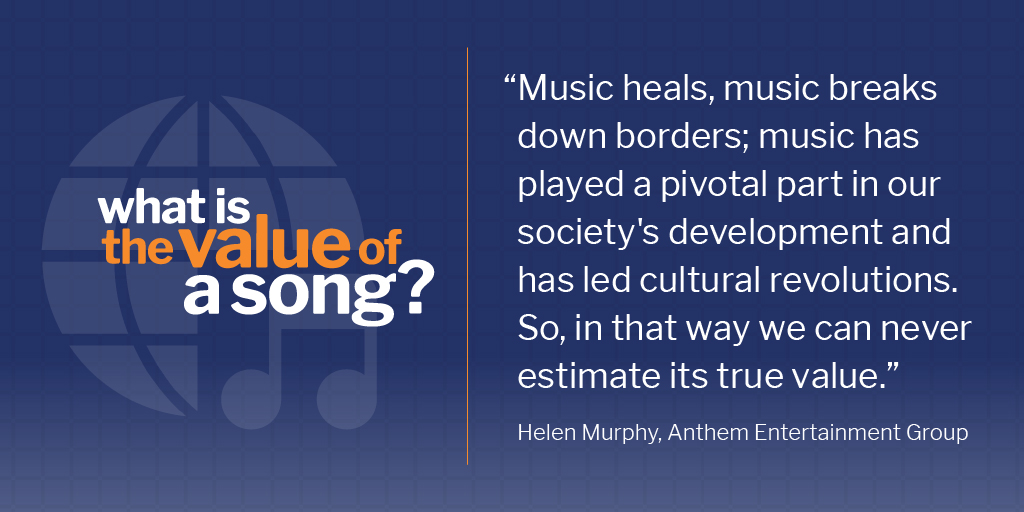by Jon Dekel
In a perfect world, Helen Murphy would be celebrating 2020 by spearheading José Feliciano’s long-awaited comeback.

Anthem Entertainment Group
The Chief Executive Officer of Anthem Entertainment Group, Murphy spent the better part of 2019 setting the stage for a comeback by the legendary guitarist and singer. She directed and co-wrote a new documentary titled Behind This Guitar, and was set to release an album of the same name followed by a regal 50th anniversary appreciation of Feliciano’s landmark Christmas song, “Feliz Navidad,” including a remastering by Billboard Producer of the Decade Rudy Perez and an imaginative new children’s book. The campaign was due to launch in March. But, like all best-laid plans, the pandemic had other ideas.
Looking back on the year that wasn’t, Murphy sounds surprisingly chipper. It’s not ideal of course, but such setbacks have inspired her to “dig (her) heels in” and work even harder. “2020 is the 50th-anniversary of “Feliz Navidad,” she explains, “and now we’re gearing up for the next 50!”
Diligence, it turns out, is a trait that’s defined Murphy’s time in the business. Speaking over the phone from her New York office, she recalls knowing she wanted to work in the industry the moment she fell in love with music as a teenager. After graduating from Ivey Business School at Western University, Murphy took her first job as an underpaid analyst for a firm that allowed her to invest in any sector that piqued her interest. “I picked merchandising and entertainment in Canada,” she recalls. “Over time, I slowly educated myself on the economics of the music industry and when I landed my first job at Polygram in 1990, I never looked back.”
Over the next three decades, Murphy built a career that appears immune to both pestilence and the whims of the industry. As the Chief Financial Officer of Polygram, she helped sell the legendary Dutch label to Seagram (which owned the Universal Music Group) in 1998 for over $10 billion USD. Two years later, as the Global Executive Vice President and CFO of Warner Music Group, she helped steer the label through the Napster era, before it too was sold for billions to a private equity group.
Following the sale of WMG in 2004, Murphy decided to branch out on her own, founding International Media Services, a strategic and financial advisory company with clients in the global media and entertainment industries including Comcast, EMI Music, Lionel Richie, Live Nation, Martha Stewart Living Omnimedia, Sony Corporation of America and Ticketmaster, among many others. As president, Murphy used her robust understanding of both the financial and creative ends of and the industry to guide artists and companies though what she describes as a tumultuous time of great change in both the publishing and recorded music business. “Roughly half my job was helping artists with their branding and their catalogue and publishing strategy,” she recalls.

Two years ago, Murphy was tapped to succeed co-founder Robert Ott as the CEO of ole Media Management. With eight offices in the U.S., UK and Canada, and a catalogue of more than 55,000 songs and 60,000 hours of film and TV music, including songs recorded by the Backstreet Boys, Beyoncé, Blake Shelton, Britney Spears, Carrie Underwood, Eric Church, Jay Z, Justin Timberlake, Kelly Clarkson, Madonna, Michael Jackson, One Direction, Rihanna, Rush, Taylor Swift, and Timbaland, it was an ideal fit, but it was the opportunity to work directly with creatives that Murphy says made the gig incredibly tantalizing.
To better reflect this attitude, last year Murphy rebranded ole as Anthem Entertainment in part as a tribute to the legendary Canadian label (ole had acquired Anthem Records in 2015). For Murphy, who had spent the majority of her adult life in the States, it was a homecoming of sorts. And it’s in that spirit she says that some of her greatest achievements as CEO of Anthem have been discovering and building Canadian talent.
“I’m very proud that in late 2019 and through 2020, we’ve invested significantly in Canada,” Murphy beams. “Songwriters and artists like Gord Bamford, Meghan Patrick, and The Reklaws… we’ve had significant success, and that’s very important to us because we’re a Canadian company. I grew up in Canada, and I’m a Canadian citizen so I’m very proud of our success there and want that to continue.”
Alongside her north-of-the-border accolades, Murphy points to the company’s series of Billboard triumphs through its Nashville office as a point of pride.
For Murphy, Anthem’s success relies on its nimbleness and hands-on personal approach. “To me, [being successful] means being a company that really pays attention to the needs and desires of songwriters and artists to expand their reach,” she explains. “In simple terms that means if there are opportunities that I see or my team sees for a songwriter or artist to be involved in an audio-visual project, a podcast, or a recording with another artist, that we’re putting them first and foremost in our mind; putting them in touch with the people outside of Anthem in the broadcast, film, or podcast industry [to go beyond their fanbase].”
This creative-first philosophy is reflected in Anthem’s success not only with current artists but also its legacy catalogue. “These iconic evergreen songs are generally results of genius moments and coming with that genius is an understanding that things change; in order to keep a share of mind, you have to try and experiment with new things,” she explains, citing her work with artists such as Rush. “Unlike the major labels where everything is new and cutting edge, I think often publishing companies are more progressive and aggressive about discussing projects and new ways to share those copyrights. As long as you exercise that diligence and perfection that goes into making something great, when you try and evolve it, [artists and songwriters] are very grateful. As long the passion and dedication to excellence, to the integrity of the original work in any derivative is never compromised, that’s the difference between good and great in a publishing and music company.”
In that spirit, Murphy says that she’s learned over her 30 years in the business that the value of a song is “priceless.” “Music heals, music breaks down borders; music has played a pivotal part in our society’s development and has led cultural revolutions,” she explains. “So, in that way, we can never estimate its true value.”
When the pandemic hit, this theory was put to the test. And, Murphy says, the fact that the publishing industry is not only surviving but, in part at least, thriving has been proof of its remarkable resilience.
“I think the outlook for music publishing is very strong,” she says. “that resiliency is a result of how music can be used in so many different ways. When one format is down like the playing records in bars and restaurants or touring, we find that other platforms become more popular, whether it’s live streaming, social media or the continued growth of new formats like a broadcast or podcast specials.”
“It’s still not as automated as I would love to see it,” she adds of the industry, “But it’s dynamic and resilient. And this resilience stretches to the artists as well. Our songwriters haven’t stopped creating songs. They’ve adapted by working over Zoom, which is not the perfect way to be creative, but I am so proud of how they continue to create.”
And, she points out, while the pandemic has delayed some of her upcoming releases, it’s also provided unexpected triumphs.
“We are very fortunate to be enjoying tremendous success with our Timbaland publishing partnership courtesy of his amazing popularity with the Verzuz series, which celebrates some of the greatest hits of all time,” Murphy boasts.
As for post-COVID plans, Murphy says she sees Anthem being more aggressive in Canada, which she says remains a well-spring of undiscovered talent.
“Take an artist and songwriter like [Saskatchewan via Nashville’s] Kalsey Kulyk,” she offers by way of example. “She was virtually unknown 18 months ago, and we discovered her through a songwriting contest. I’d say she really has all the earmarks of being a true superstar. And I think it’s that hard work in periods [such as this one] that really yields success over a long period of time.”
“You’re not going to get a hundred percent success on everything you do,” Murphy adds. “But you have got to get up to bat every day.”
Thinking about becoming a client of CMRRA? Already a client but you have questions? Email us at [email protected] and we’ll get you the answers you need.


